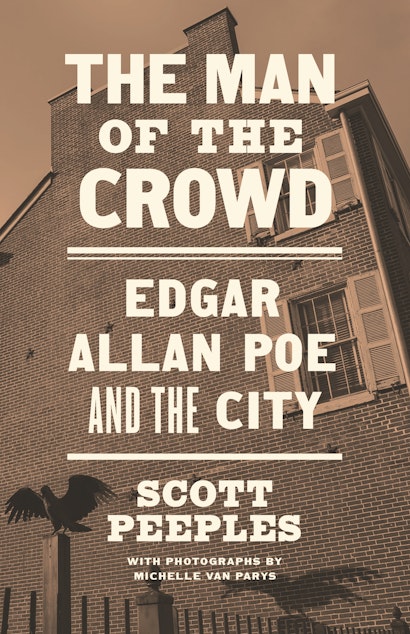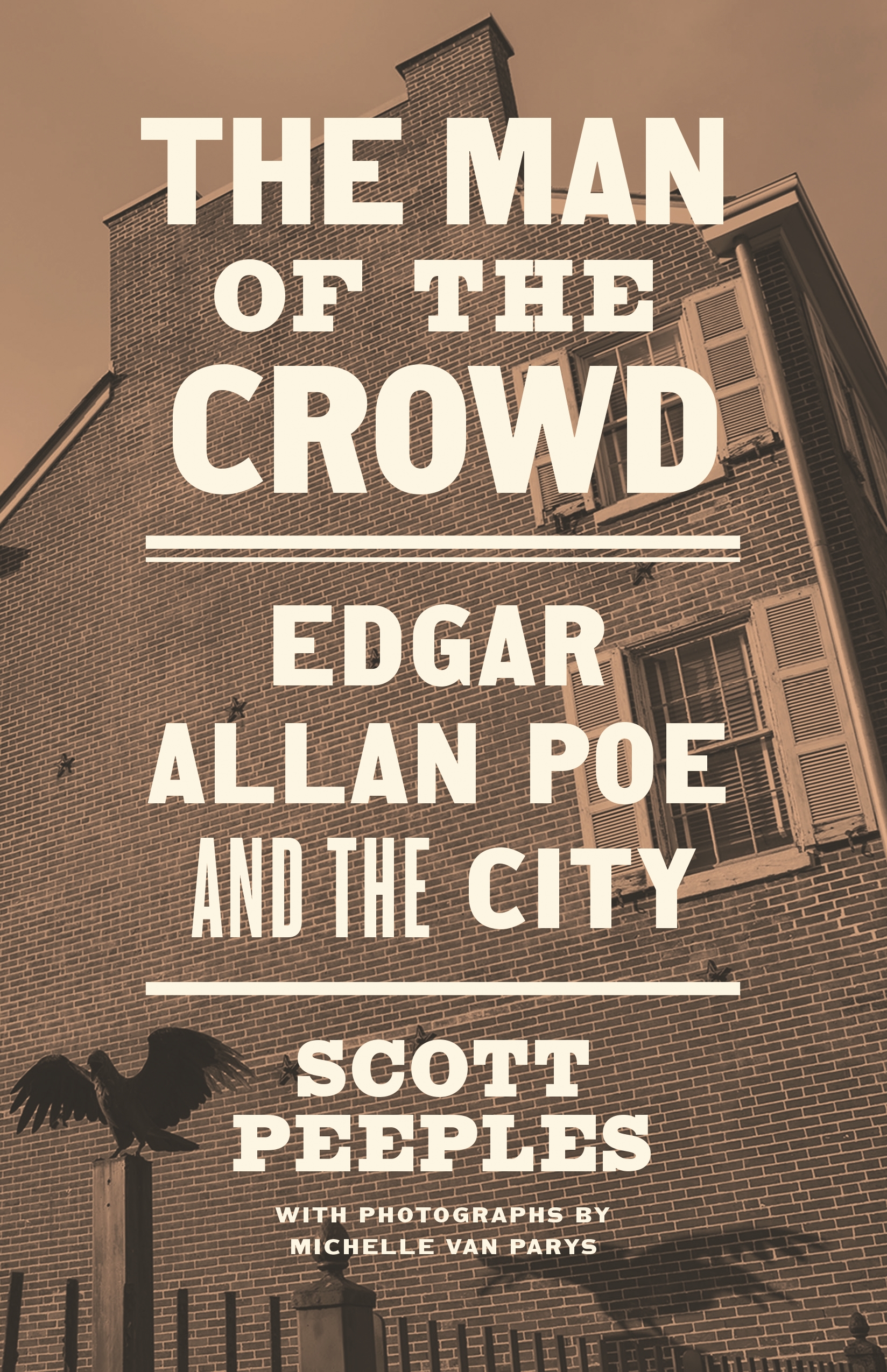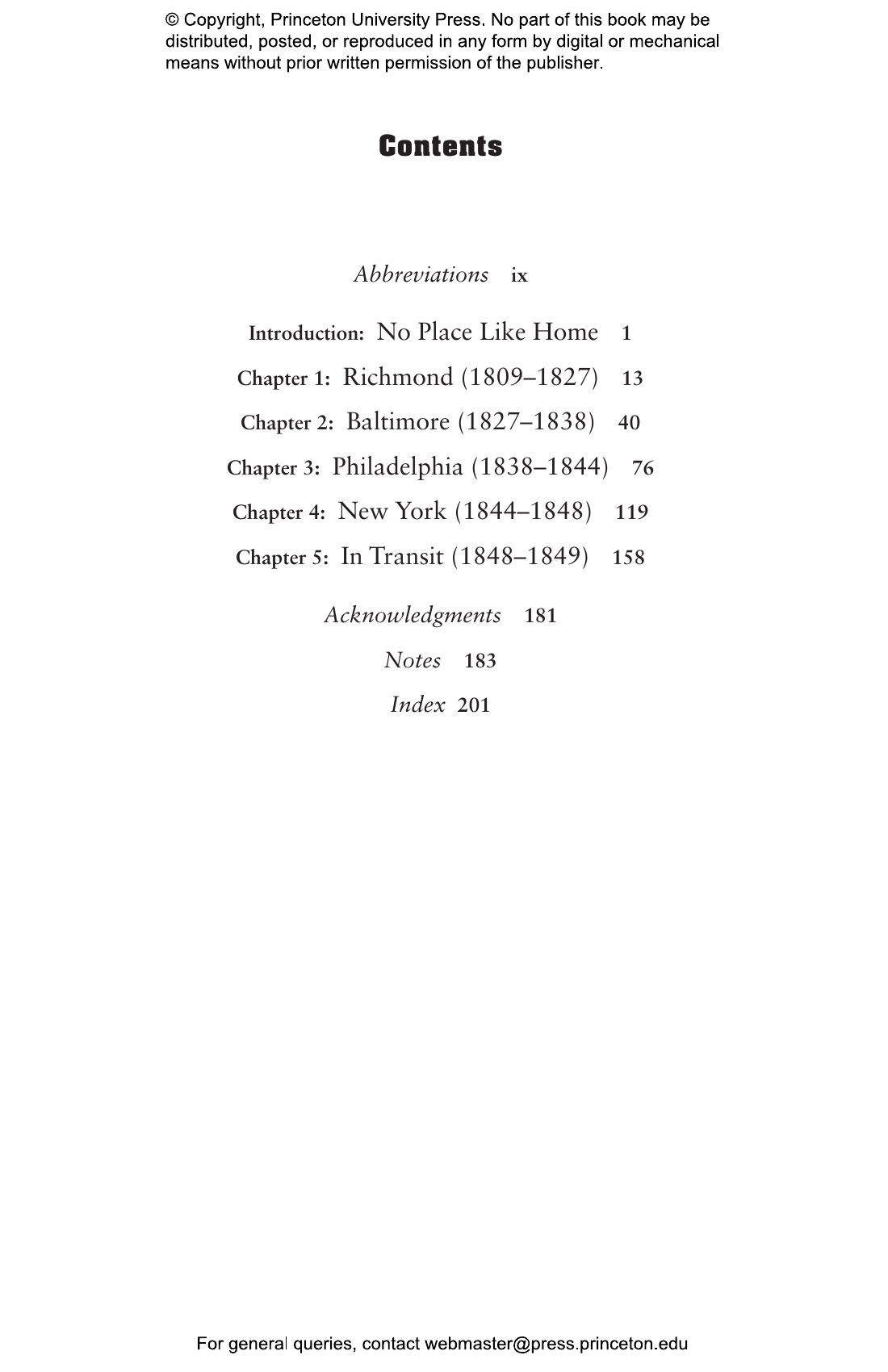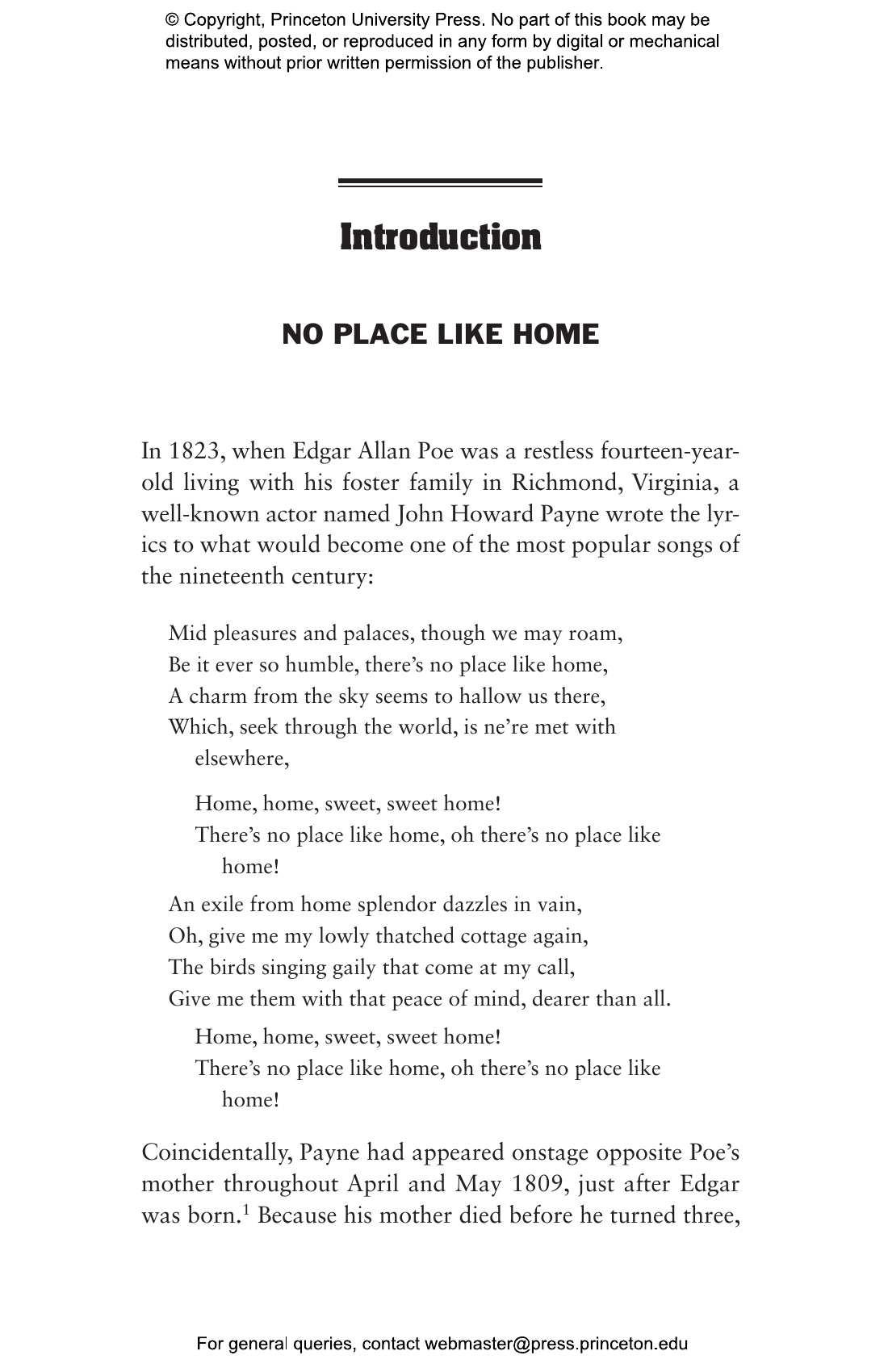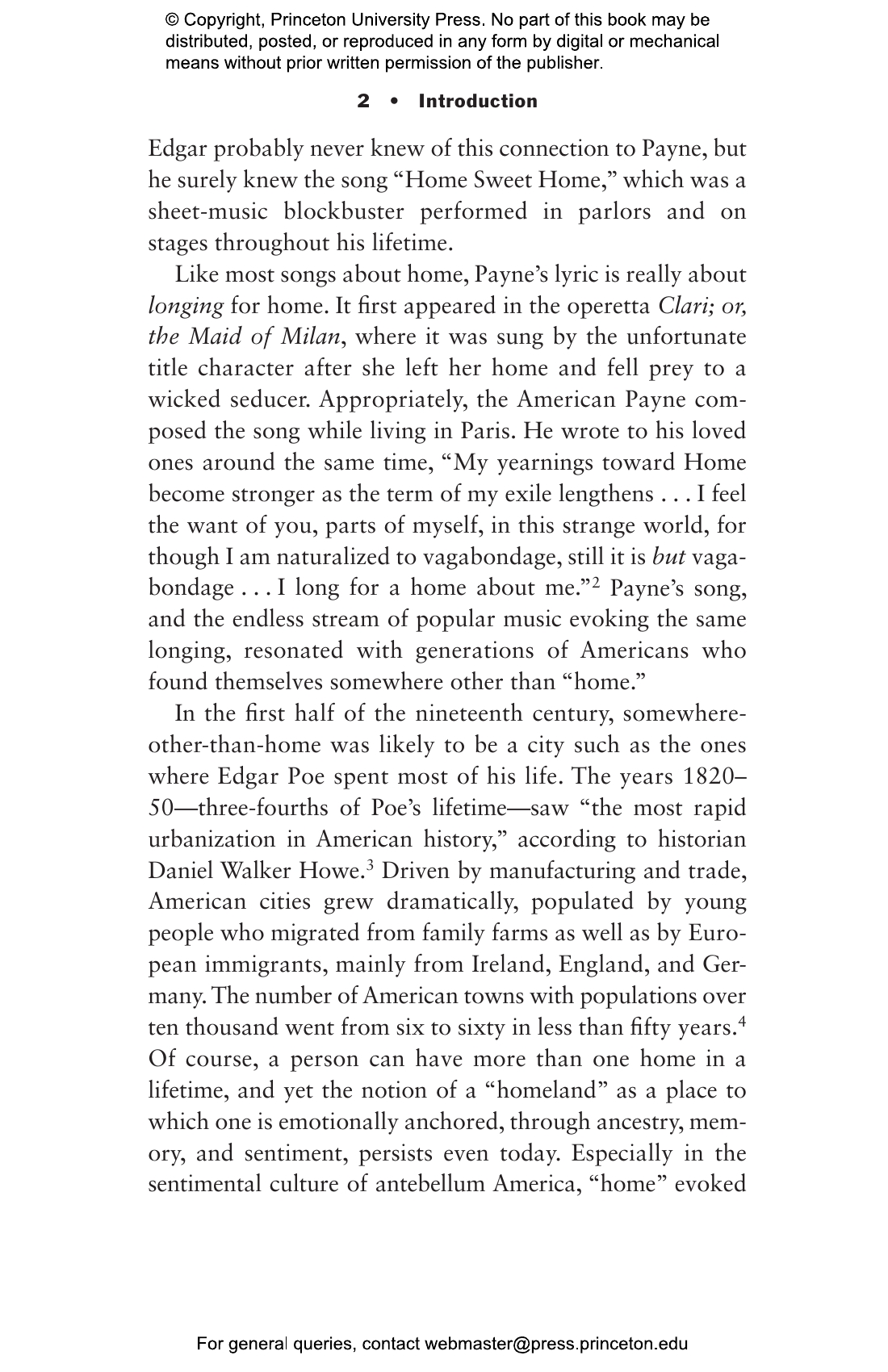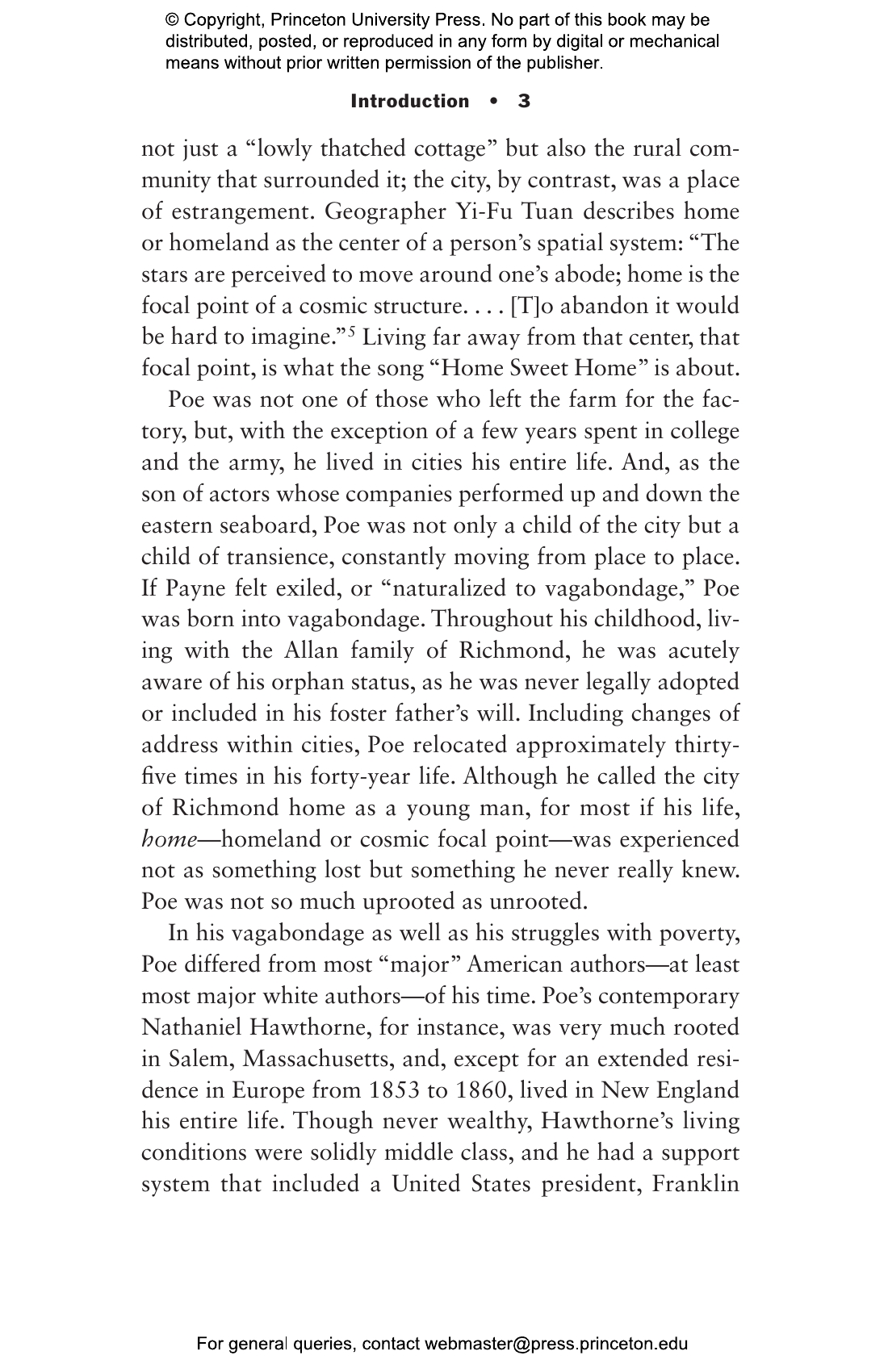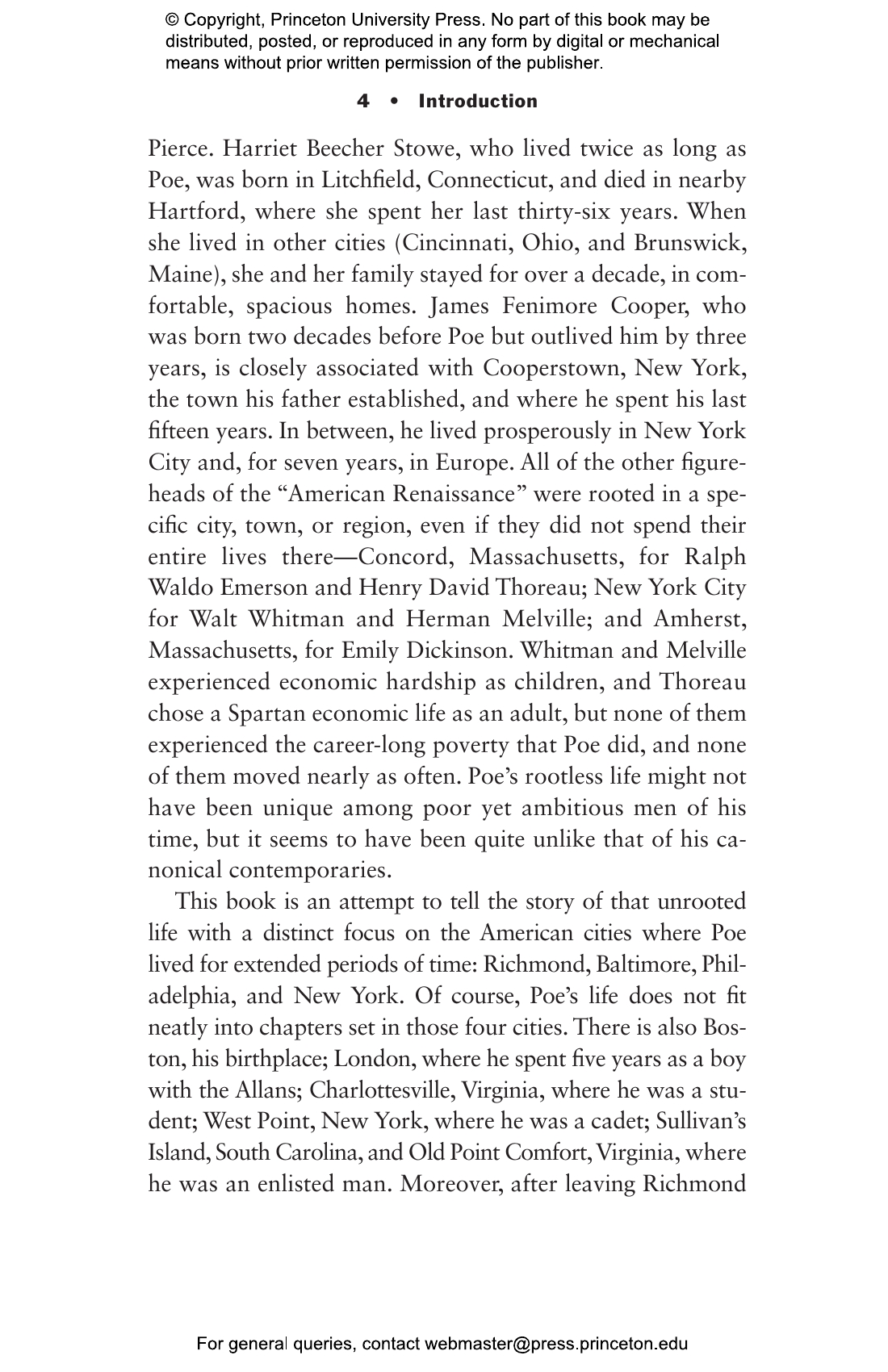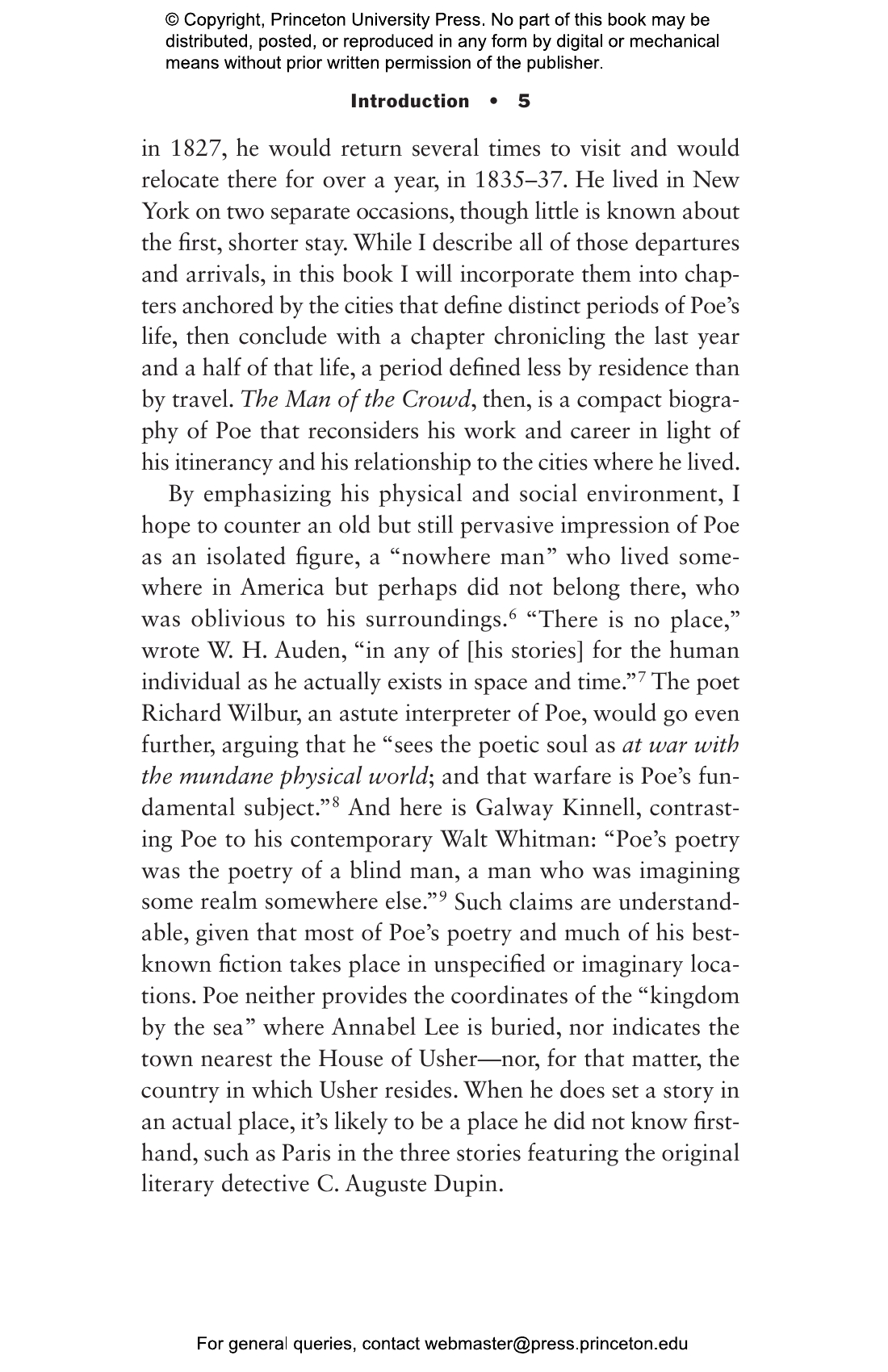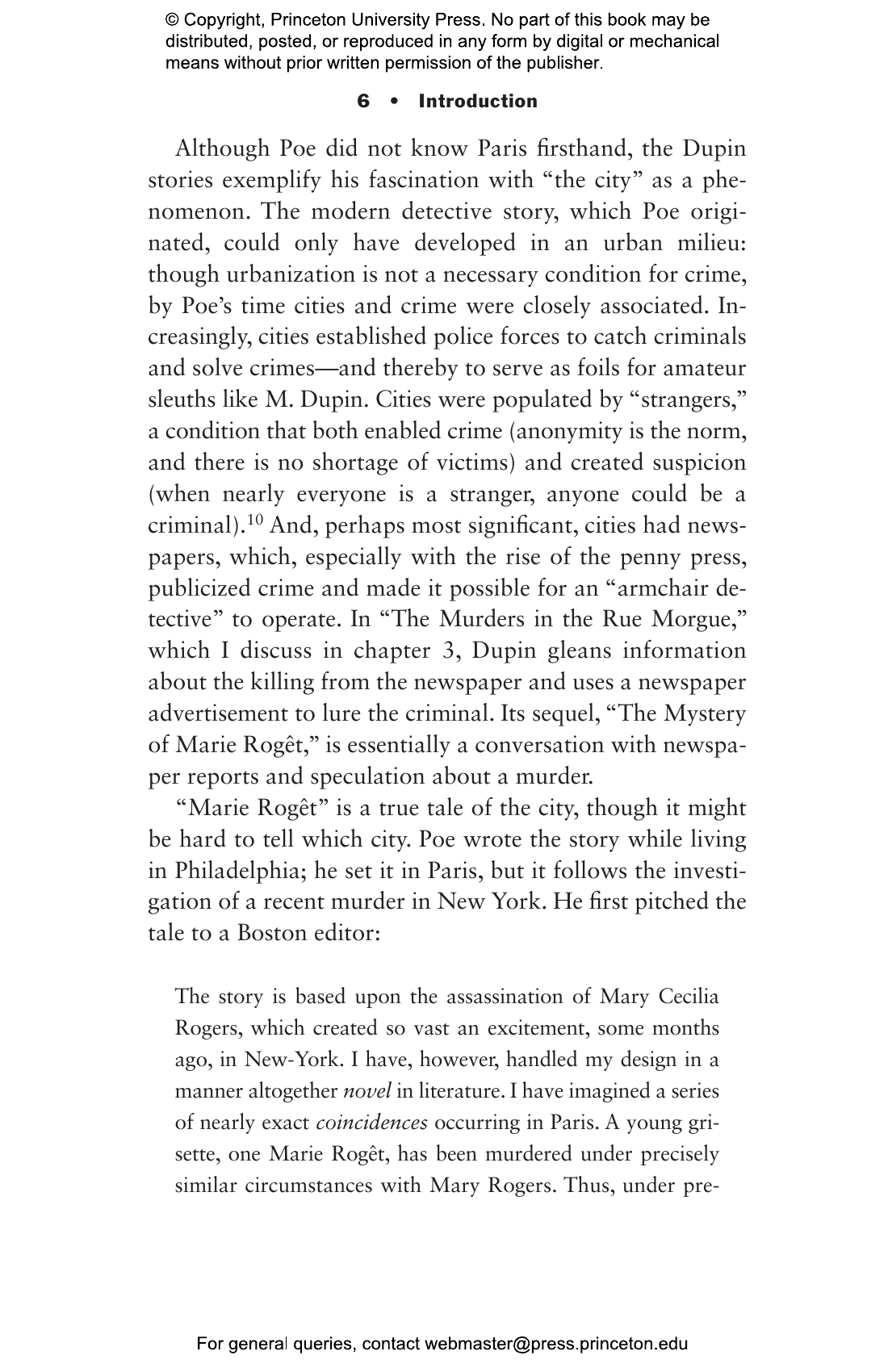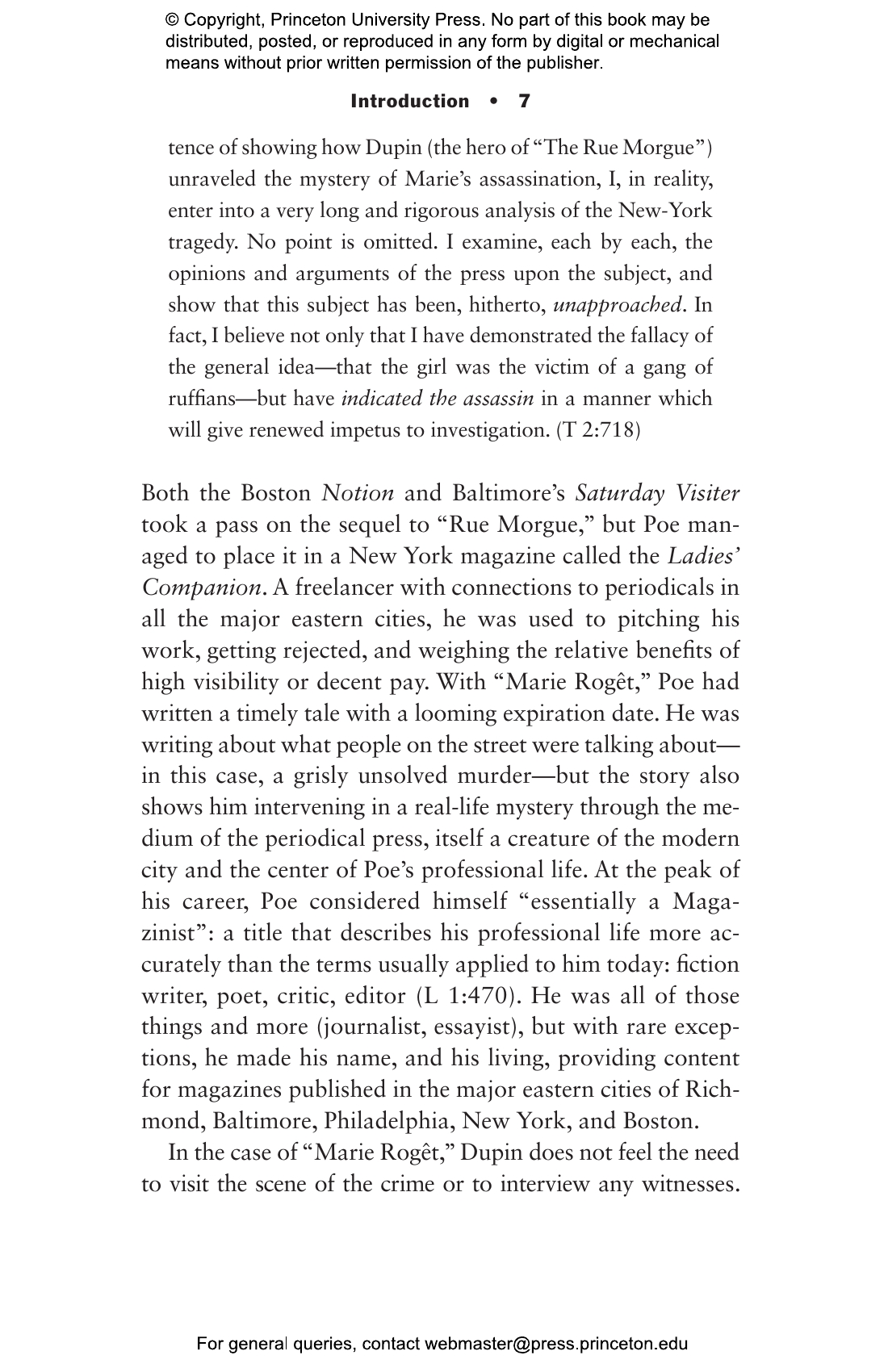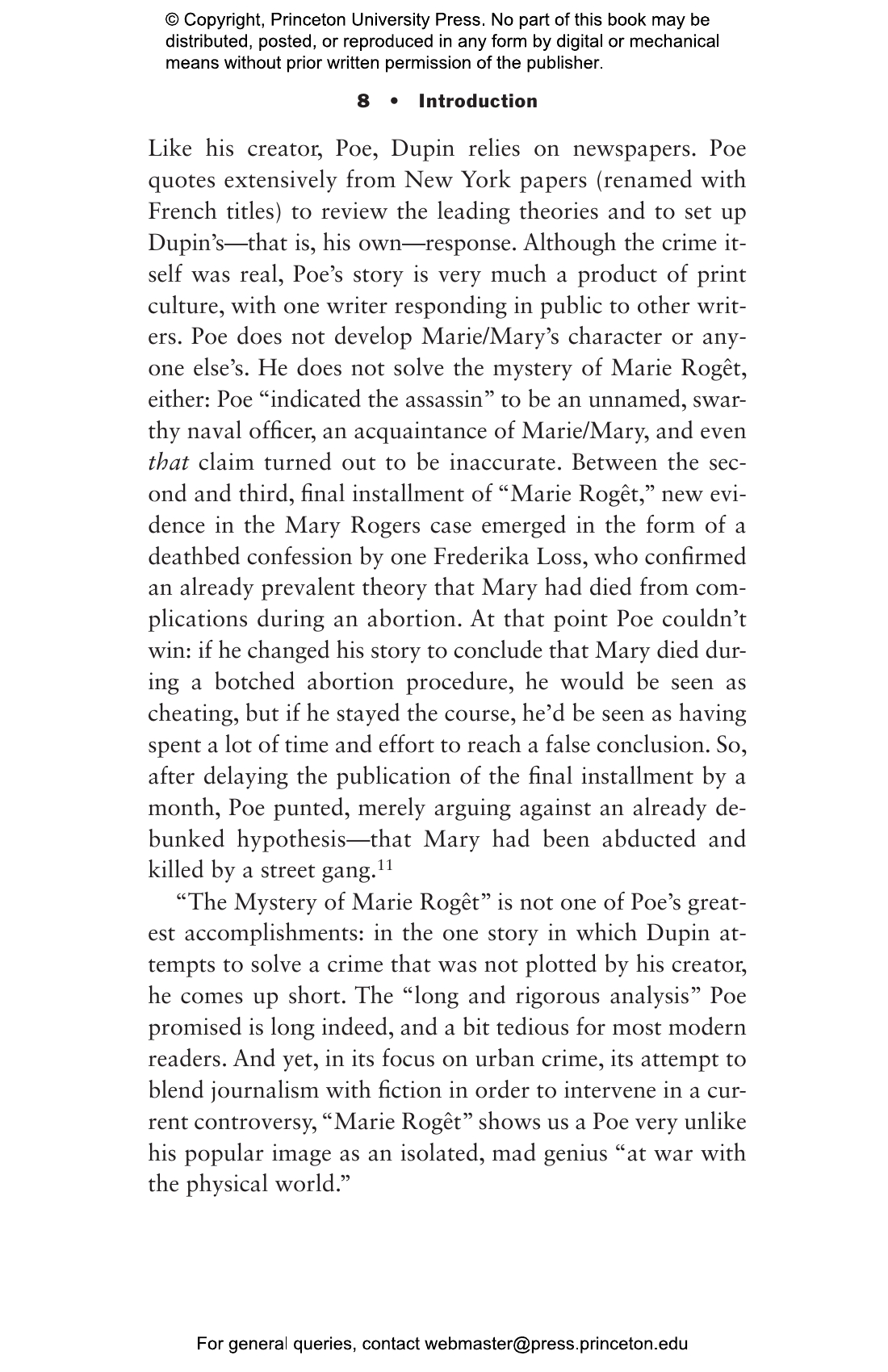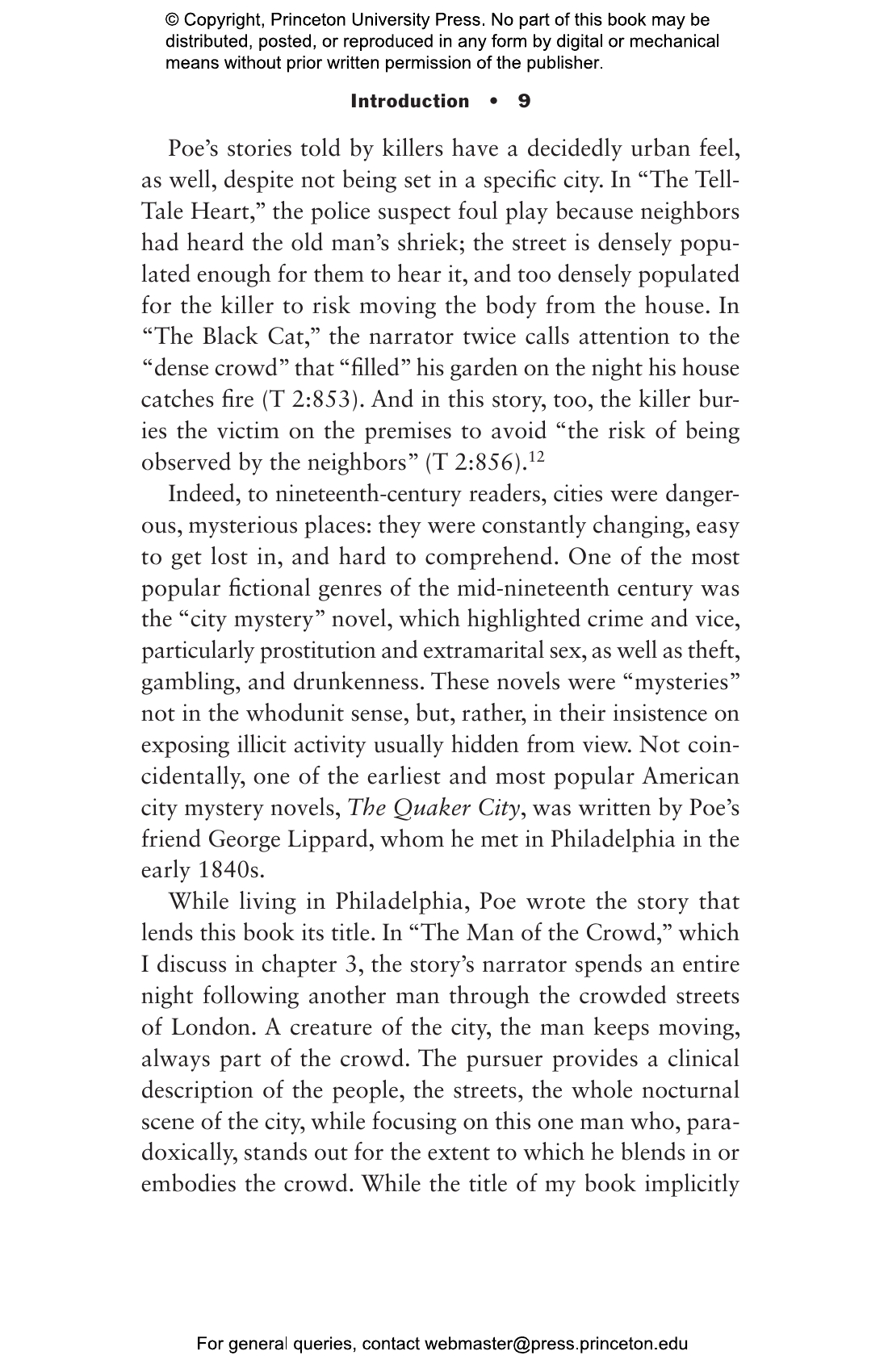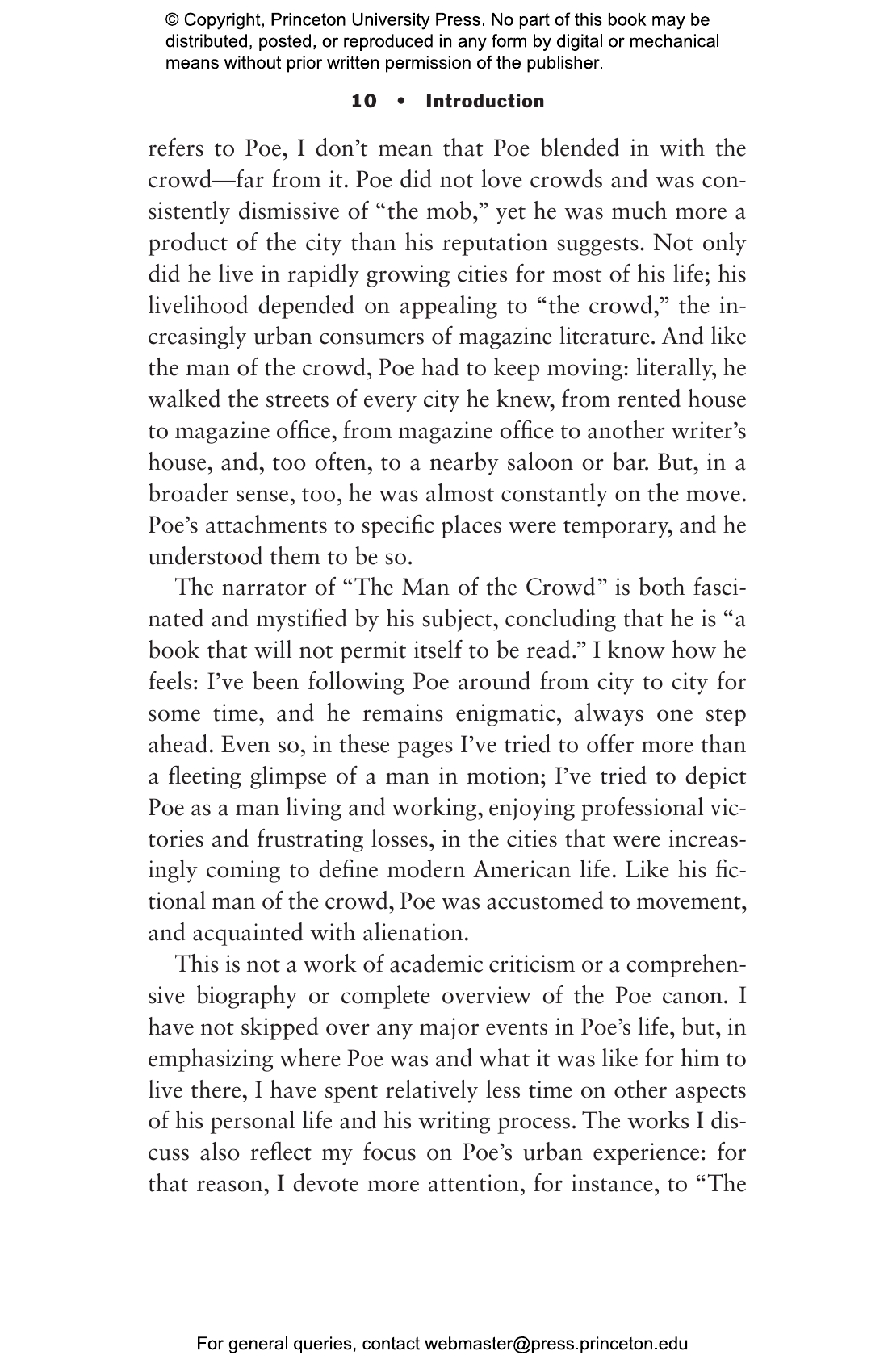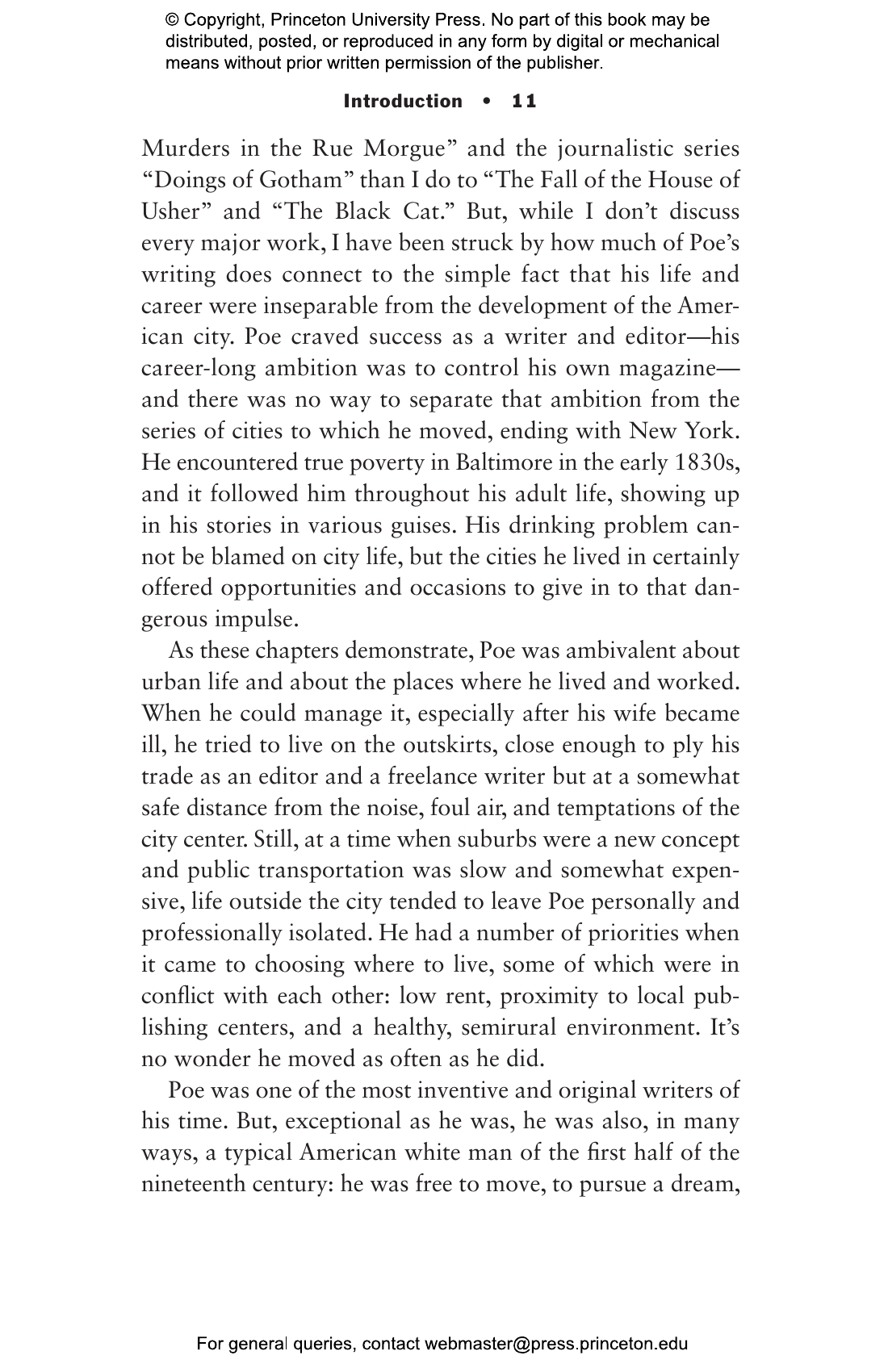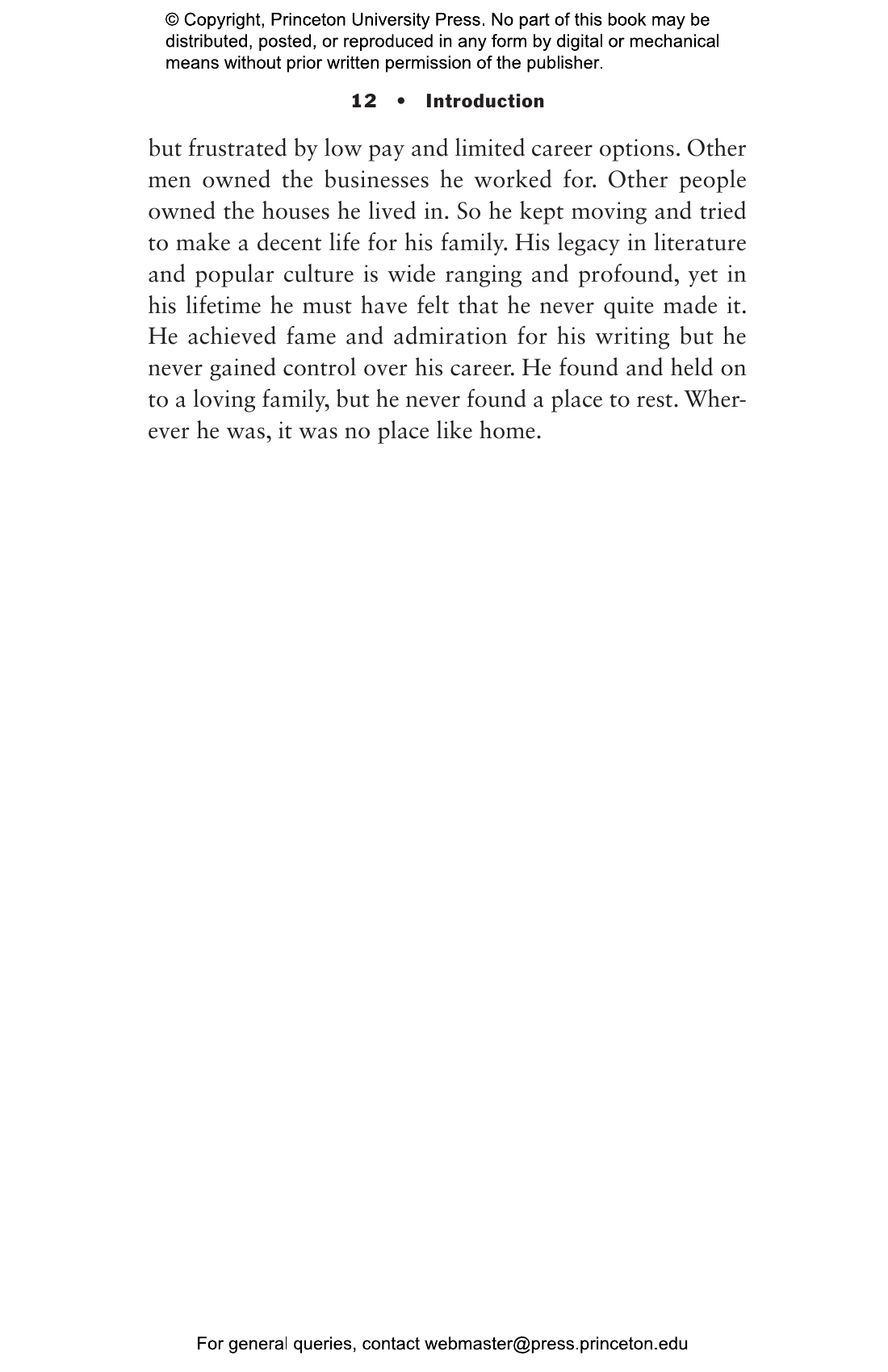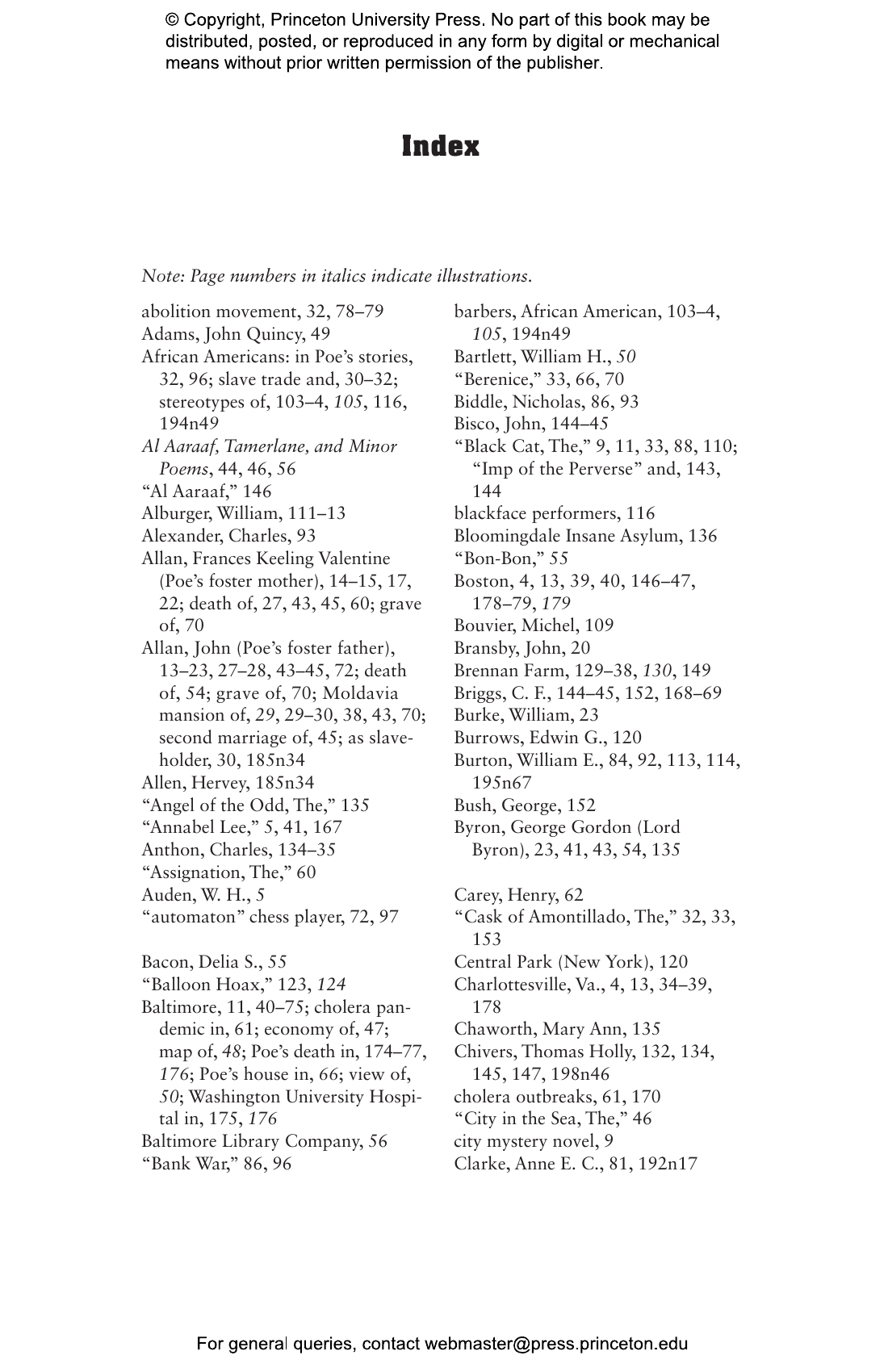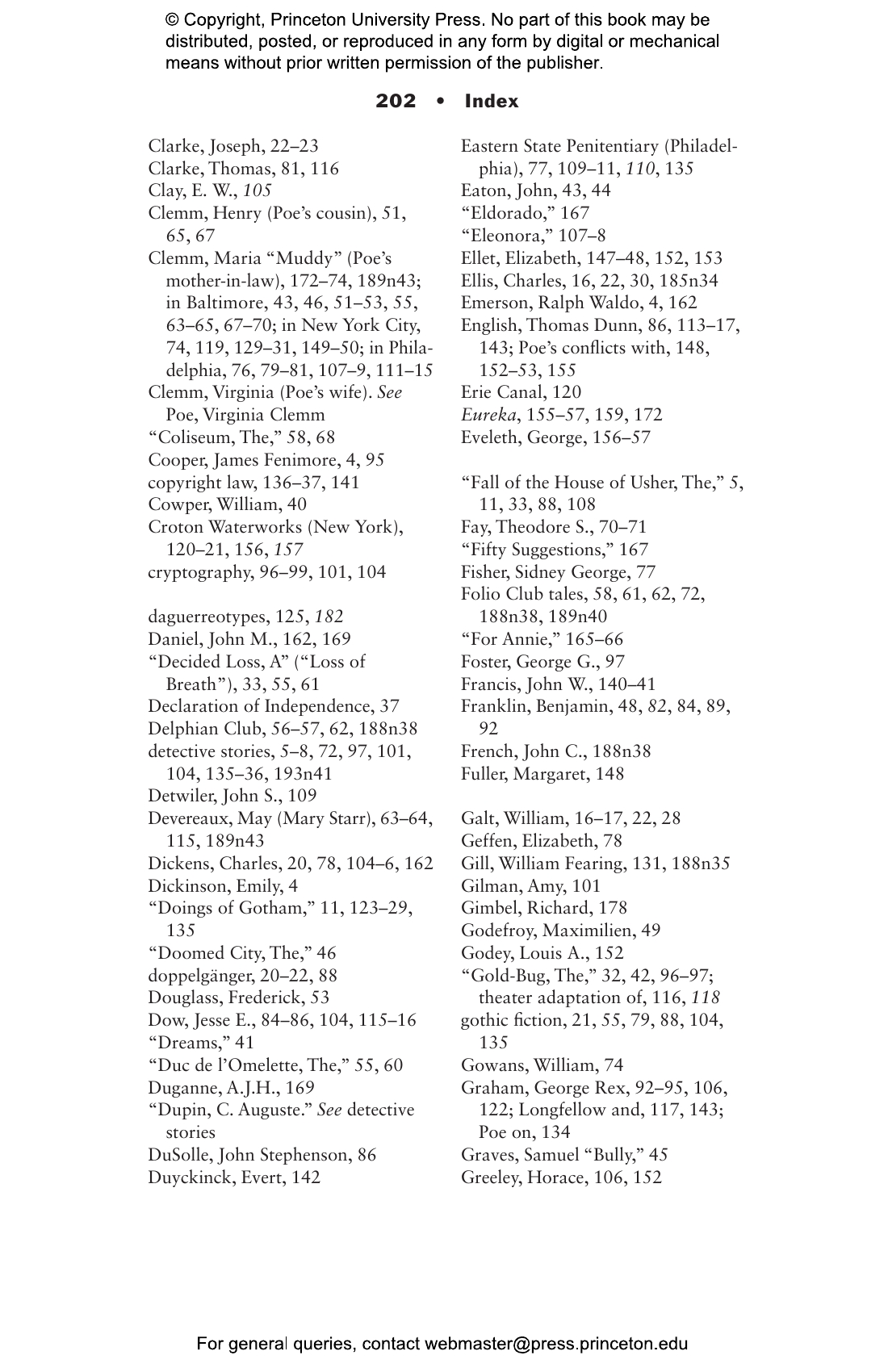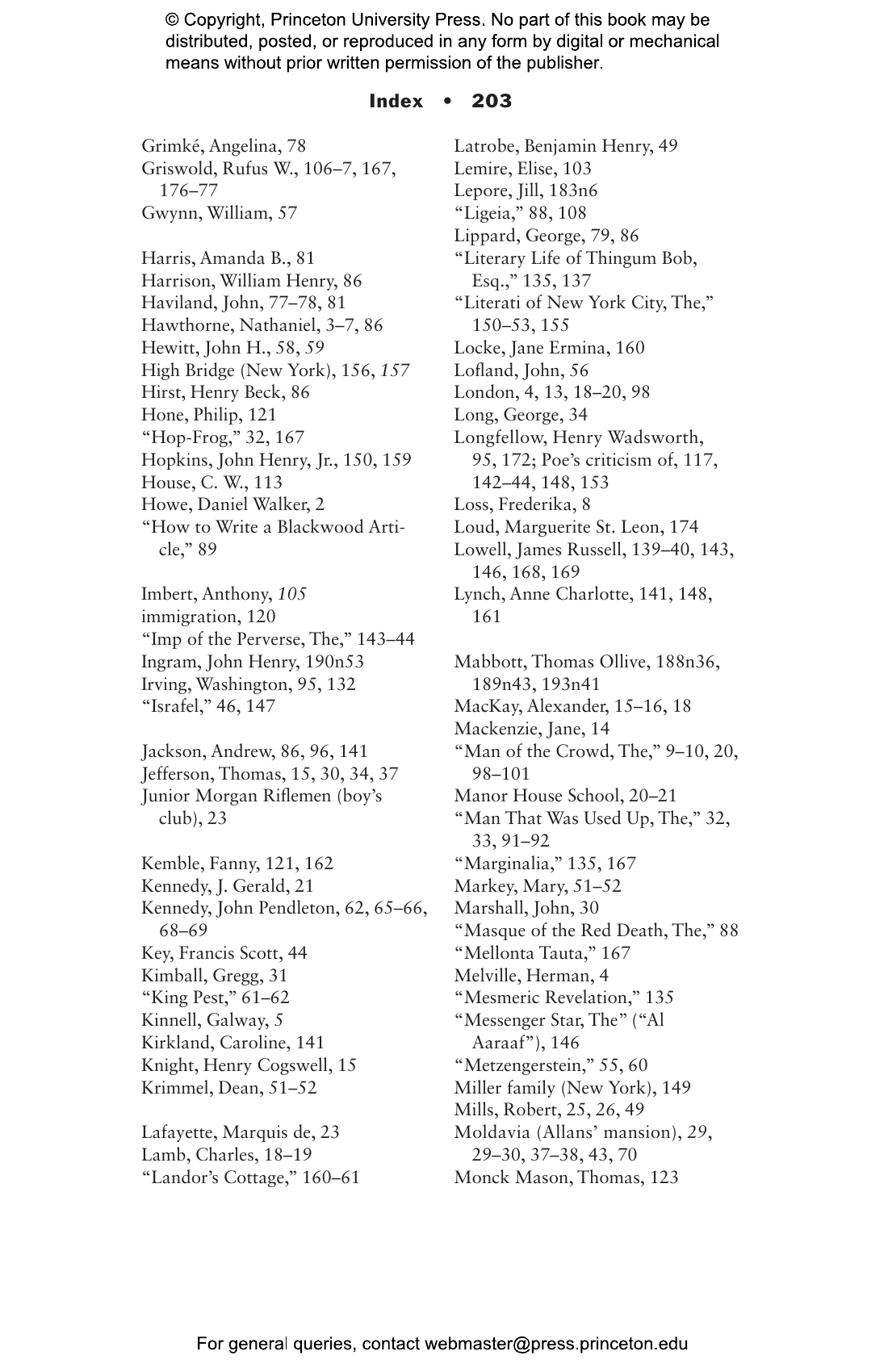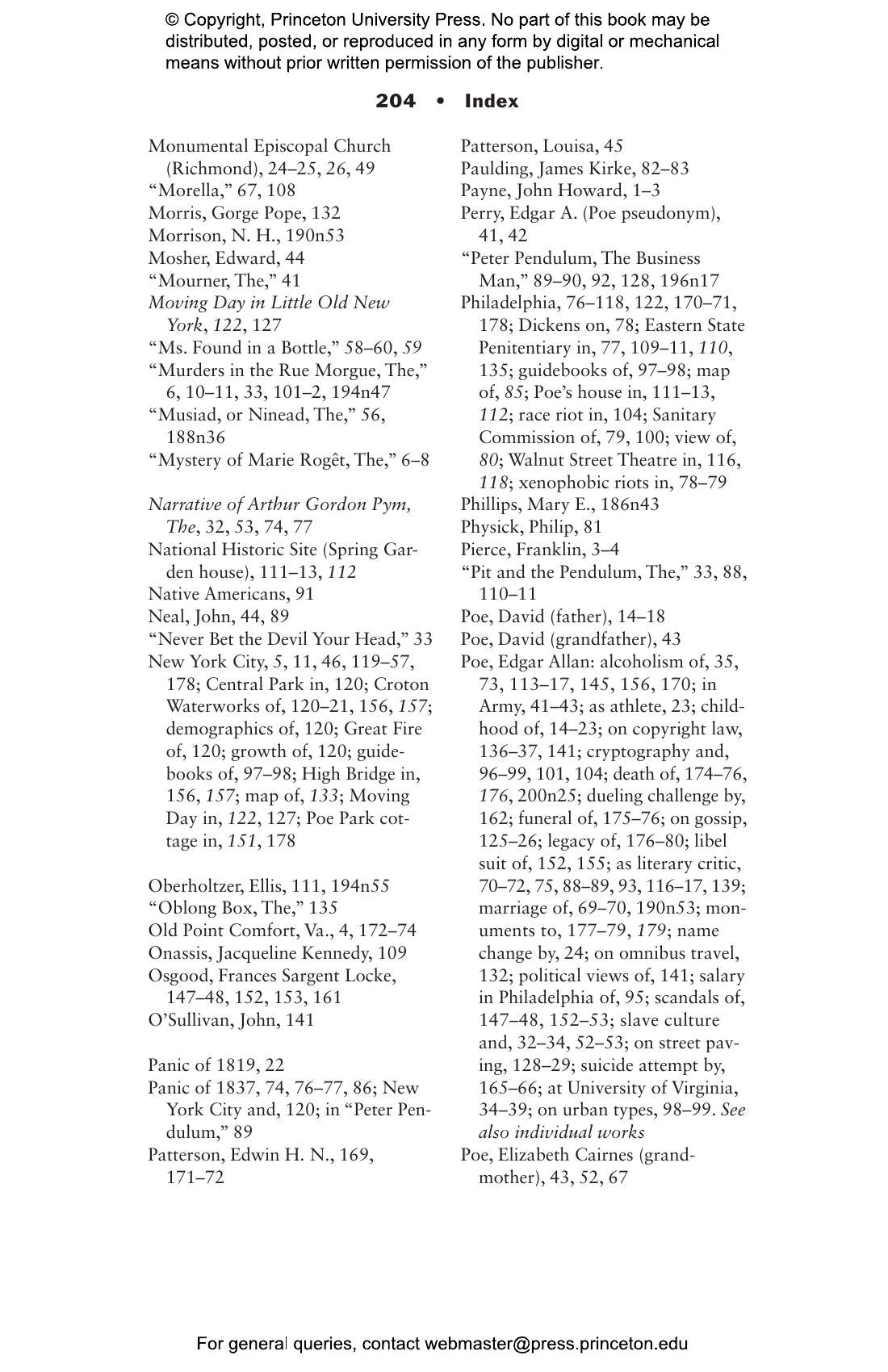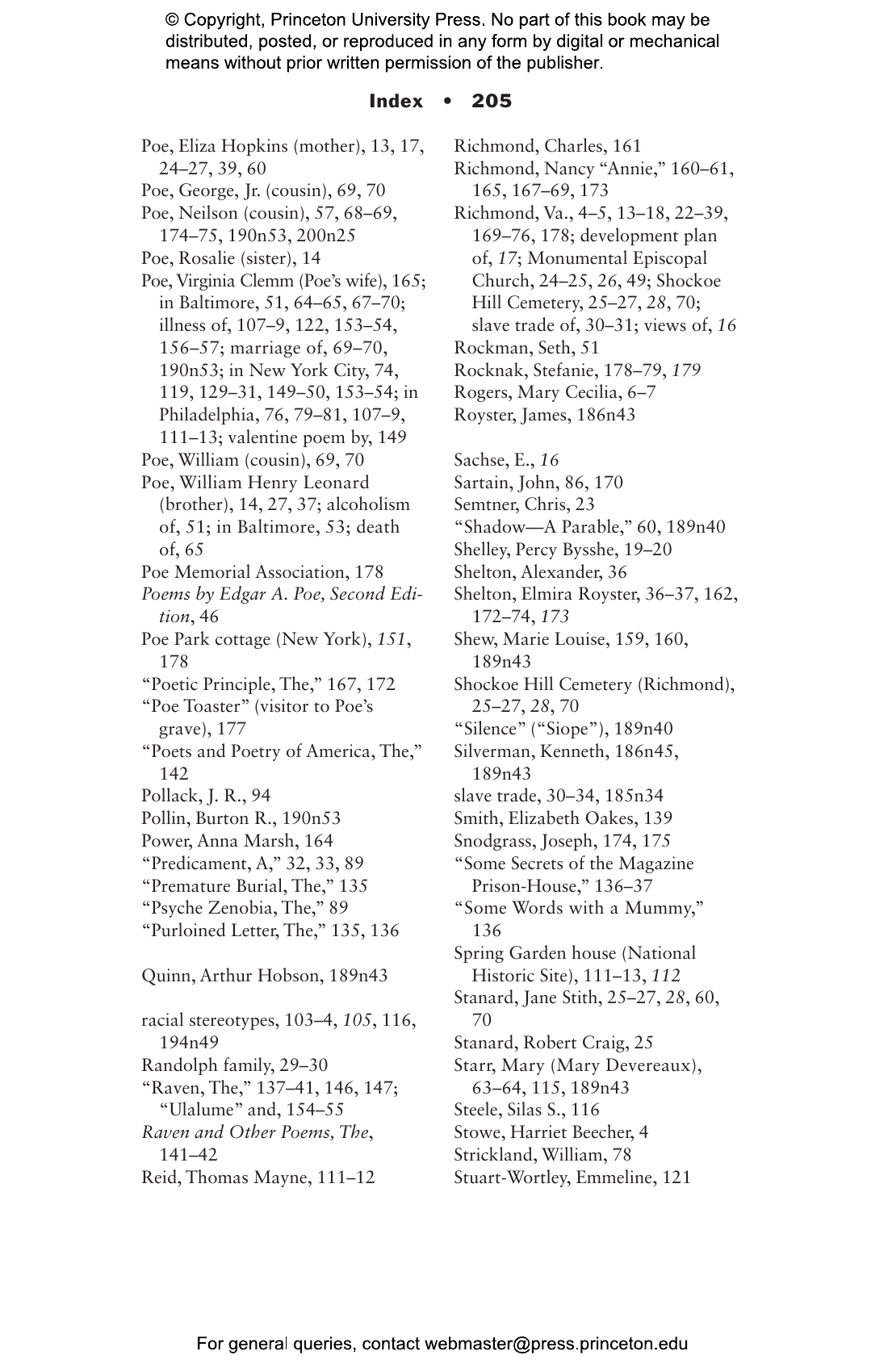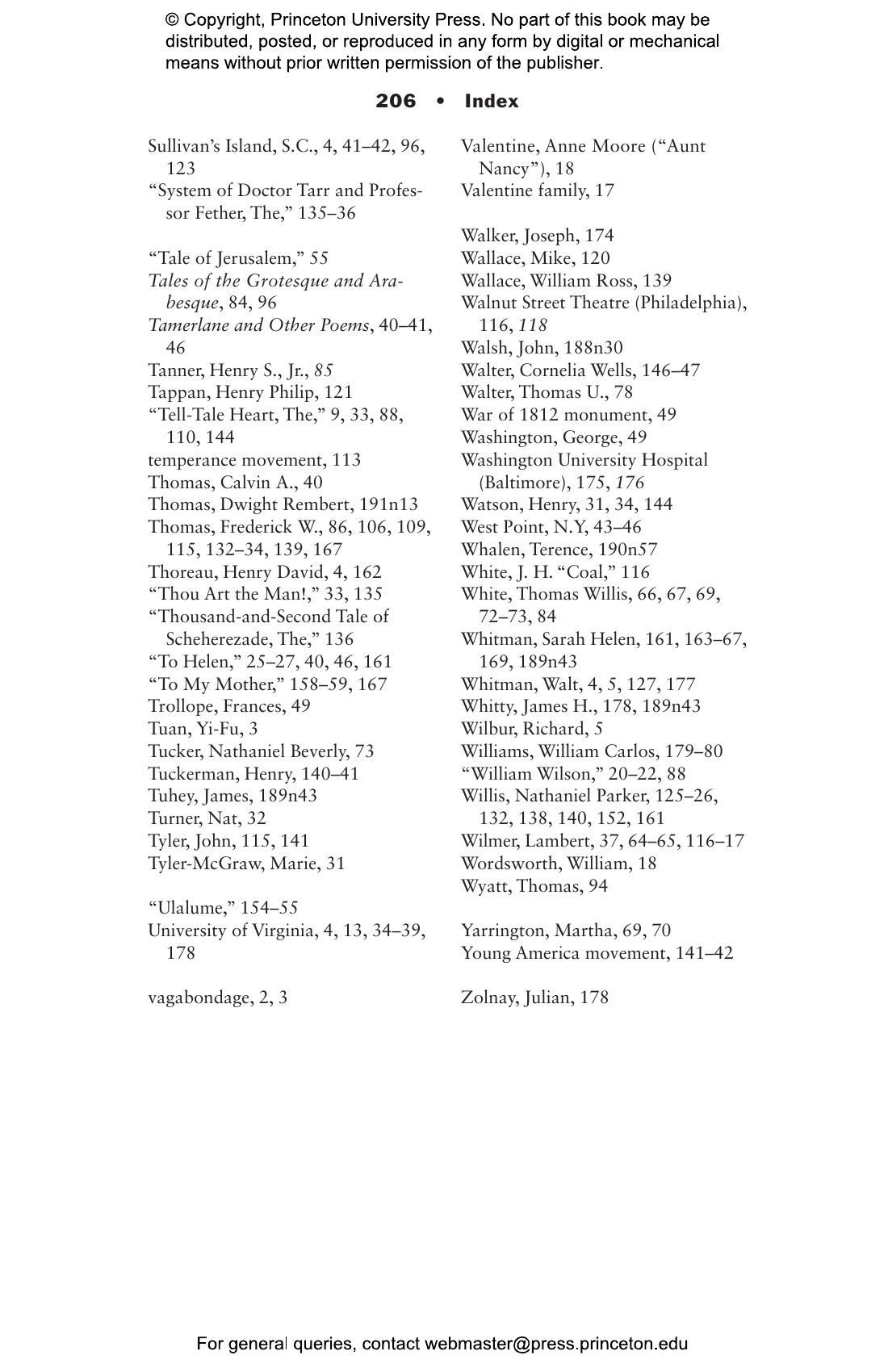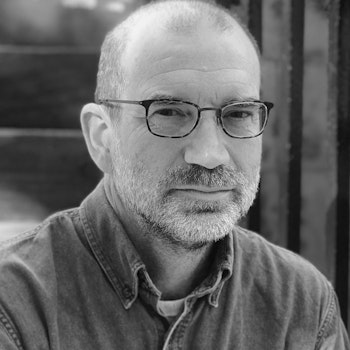Edgar Allan Poe (1809–1849) changed residences about once a year throughout his life. Driven by a desire for literary success and the pressures of supporting his family, Poe sought work in American magazines, living in the cities that produced them. Scott Peeples chronicles Poe’s rootless life in the cities, neighborhoods, and rooms where he lived and worked, exploring how each new place left its enduring mark on the writer and his craft.
Poe wrote short stories, poems, journalism, and editorials with urban readers in mind. He witnessed urban slavery up close, living and working within a few blocks of slave jails and auction houses in Richmond and among enslaved workers in Baltimore. In Philadelphia, he saw an expanding city struggling to contain its own violent propensities. At a time when suburbs were just beginning to offer an alternative to crowded city dwellings, he tried living cheaply on the then-rural Upper West Side of Manhattan, and later in what is now the Bronx. Poe’s urban mysteries and claustrophobic tales of troubled minds and abused bodies reflect his experiences living among the soldiers, slaves, and immigrants of the American city.
Featuring evocative photographs by Michelle Van Parys, The Man of the Crowd challenges the popular conception of Poe as an isolated artist living in a world of his own imagination, detached from his physical surroundings. The Poe who emerges here is a man whose outlook and career were shaped by the cities where he lived, longing for a stable home.
Awards and Recognition
- An Untapped Cities Best Book of All Time
"A deeply informed, academic work, but highly readable."—Steven Carroll, Sydney Morning Herald
"The Man of the Crowd is a thoroughly engaging book about the legendary writer and his complex relationship with the urban environment. Peeples is to be commended for deploying a unique lens for further examining the tortured genius of the great Edgar Allan Poe."—Leonora Cravotta, American Spectator
"[A] superb new biograph[y] of Poe. . . . The Man of the Crowd . . . give[s] us a clearer view of Poe as a man and an artist, while at the same time showing how the myth mill about him was busy from the start, forming and deforming his choices, and creating the brand of Poe we know today."—Jonathan Elmer, Public Books
"Engaging. . . . [The Man of the Crowd] succeeds admirably in bringing us closer to a man we can now better appreciate as part of the crowd rather than a remote and inexplicable monad."—Ian Finseth, Edgar Allan Poe Review
"The Man of the Crowd, by Scott Peeples, has something for everyone. It should be equally attractive to Edgar Allan Poe scholars, aficionados, and those who simply want to read more of Poe’s stories, poems, and essays."—Henry T. Edmonson III, Law & Liberty
"What sets Scott Peeples’s ‘compact biography’ apart from other recent work is that it also concerns cities, specifically Richmond, Baltimore, Philadelphia, and New York, where Poe spent much of his life and which stirred his imagination. Peeples’s aim is to re-contextualize the image of Poe as a campy ‘nowhere man,’. . . . In detailing Poe’s moves from city to city, Peeples presents an ambitious young man seeking to support his family and to establish himself as a writer, critic, and editor."—Katherine J. Kim, The Metropole
"A welcome, engaging introduction to Poe’s life. . . . This compact biography is an affable ramble, a genial journey, with Poe through the years. It knowledgeably and accessibly recounts Poe’s urban contexts and relates his relevant texts. . . . The whole is interestingly complemented by archival images of contemporary maps and periodicals and by archival photographs, blended photographs, and recent photographs by Michelle Van Parys of various Poe sites and locales. This volume is a useful vade mecum for our armchair Poe peregrinations."—Richard Kopley, Poe Studies
"Peeples convincingly demonstrates that Poe remained “in transit” throughout his life, despite his literary successes, and was never in full control of his career. This accessible book will interest casual readers and Poe scholars alike."—Choice
"Well-researched . . . [and] deeply informed. . . . Scott Peeples's streamlined account of Poe's journeys . . . grounds itself determinedly in the arc of his life's movement through various urban social realities. . . . This biography achieves its freshness through framing Poe's life as a series of chapters related to the cities in which he took up primary residence."—Stephen Rachman, Poe Studies
"A highly absorbing, important, and superbly crafted study that deserves a place on the top shelf of Poe biographies."—Jason Richards, American Literary History
"Scott Peeples has plumbed the deep psychic landscape of Poe with passion and skill, bringing us back to his writings again and again with fresh insights. The Man of the Crowd is beautifully written and remarkably adroit. A major accomplishment."—Jay Parini, author of Robert Frost and Empire of Self: A Life of Gore Vidal
"For all the Gothic pretensions of his fiction, Edgar Allan Poe spent his life in frantic negotiation with the realities of an urbanizing America. He hopscotched the Eastern Seaboard, fleeing debt while pursuing his dream of a truly literary American magazine. As Scott Peeples shows in this meticulously researched book, that dream was not to be; but the dynamism of Poe’s encounters with the American city lives on in some of his most prescient and distinguished work."—Shawn Rosenheim, coeditor of The American Face of Edgar Allan Poe
"This evocative and elegantly written book offers a fresh way of understanding Poe. The Man of the Crowd is a lively and compelling read."—Sandra Tomc, author of Industry and the Creative Mind: The Eccentric Writer in American Literature and Entertainment, 1790–1860
"Accessible and engaging. By focusing on the cities, neighborhoods, and streets that influenced Poe's personal life and writings, Scott Peeples offers a unique account of the famous author's search for professional success and a place to call home."—Paul Christian Jones, author of Against the Gallows: Antebellum American Writers and the Movement to Abolish Capital Punishment
